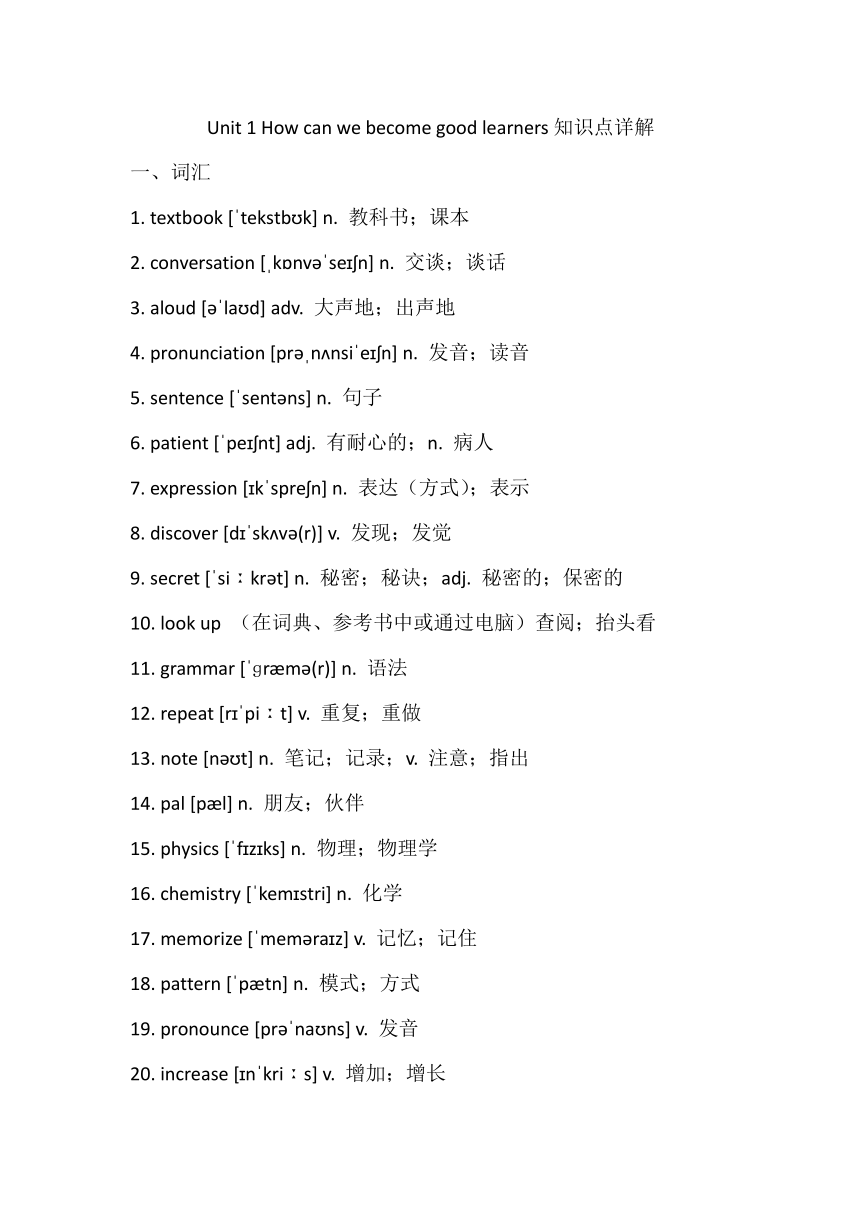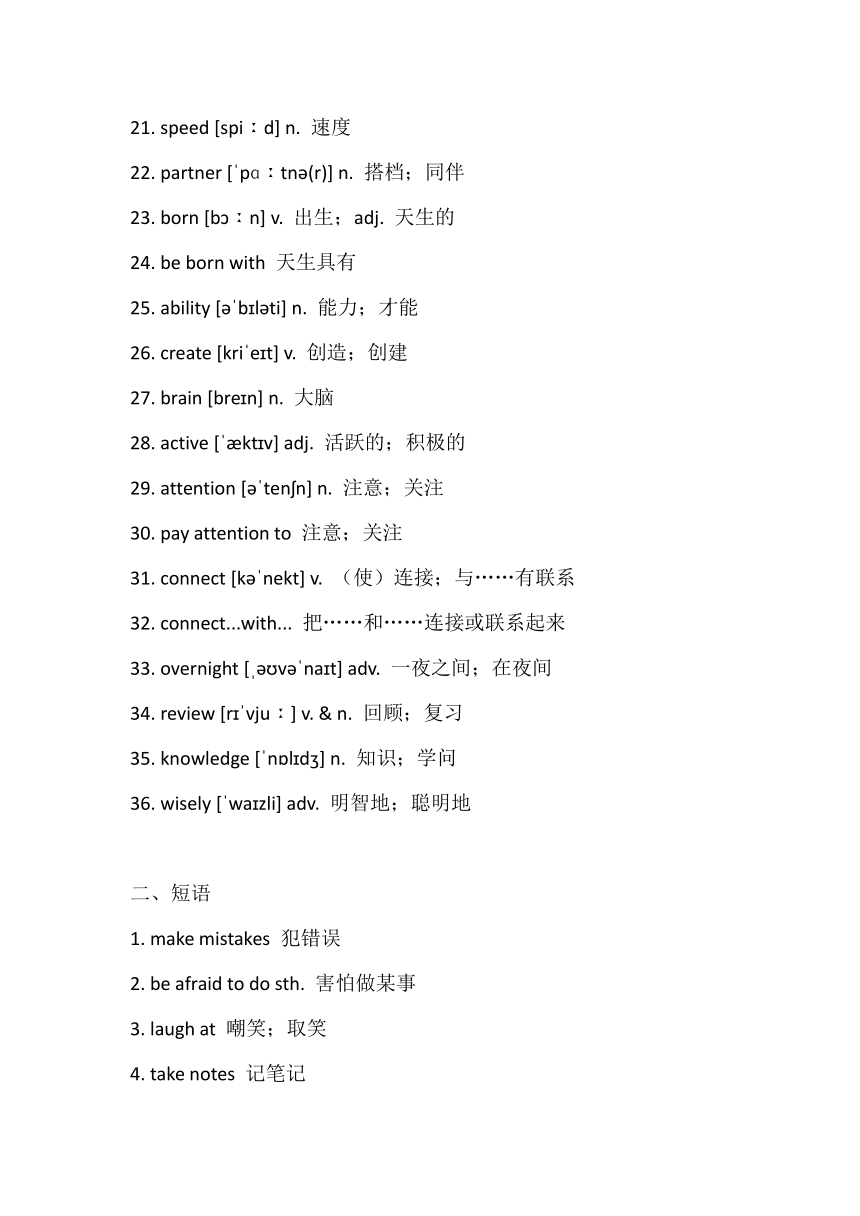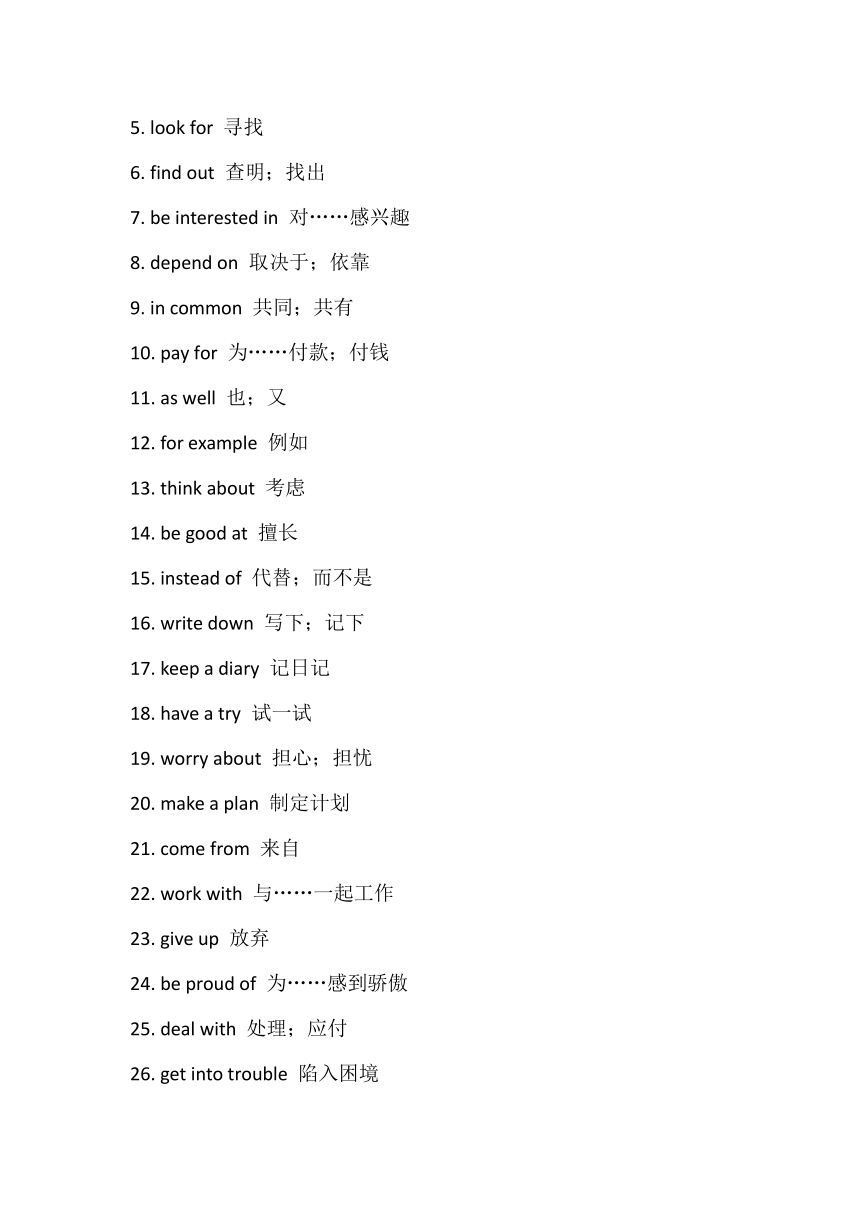Unit 1 How can we become good learners?知识点详解 2024-2025学年人教版九年级英语全册
文档属性
| 名称 | Unit 1 How can we become good learners?知识点详解 2024-2025学年人教版九年级英语全册 |

|
|
| 格式 | docx | ||
| 文件大小 | 20.1KB | ||
| 资源类型 | 教案 | ||
| 版本资源 | 人教新目标(Go for it)版 | ||
| 科目 | 英语 | ||
| 更新时间 | 2024-09-10 00:00:00 | ||
图片预览



文档简介
Unit 1 How can we become good learners 知识点详解
一、词汇
1. textbook [ tekstb k] n. 教科书;课本
2. conversation [ k nv se n] n. 交谈;谈话
3. aloud [ la d] adv. 大声地;出声地
4. pronunciation [pr n nsi e n] n. 发音;读音
5. sentence [ sent ns] n. 句子
6. patient [ pe nt] adj. 有耐心的;n. 病人
7. expression [ k spre n] n. 表达(方式);表示
8. discover [d sk v (r)] v. 发现;发觉
9. secret [ si kr t] n. 秘密;秘诀;adj. 秘密的;保密的
10. look up (在词典、参考书中或通过电脑)查阅;抬头看
11. grammar [ ɡr m (r)] n. 语法
12. repeat [r pi t] v. 重复;重做
13. note [n t] n. 笔记;记录;v. 注意;指出
14. pal [p l] n. 朋友;伙伴
15. physics [ f z ks] n. 物理;物理学
16. chemistry [ kem stri] n. 化学
17. memorize [ mem ra z] v. 记忆;记住
18. pattern [ p tn] n. 模式;方式
19. pronounce [pr na ns] v. 发音
20. increase [ n kri s] v. 增加;增长
21. speed [spi d] n. 速度
22. partner [ pɑ tn (r)] n. 搭档;同伴
23. born [b n] v. 出生;adj. 天生的
24. be born with 天生具有
25. ability [ b l ti] n. 能力;才能
26. create [kri e t] v. 创造;创建
27. brain [bre n] n. 大脑
28. active [ kt v] adj. 活跃的;积极的
29. attention [ ten n] n. 注意;关注
30. pay attention to 注意;关注
31. connect [k nekt] v. (使)连接;与……有联系
32. connect...with... 把……和……连接或联系起来
33. overnight [ v na t] adv. 一夜之间;在夜间
34. review [r vju ] v. & n. 回顾;复习
35. knowledge [ n l d ] n. 知识;学问
36. wisely [ wa zli] adv. 明智地;聪明地
二、短语
1. make mistakes 犯错误
2. be afraid to do sth. 害怕做某事
3. laugh at 嘲笑;取笑
4. take notes 记笔记
5. look for 寻找
6. find out 查明;找出
7. be interested in 对……感兴趣
8. depend on 取决于;依靠
9. in common 共同;共有
10. pay for 为……付款;付钱
11. as well 也;又
12. for example 例如
13. think about 考虑
14. be good at 擅长
15. instead of 代替;而不是
16. write down 写下;记下
17. keep a diary 记日记
18. have a try 试一试
19. worry about 担心;担忧
20. make a plan 制定计划
21. come from 来自
22. work with 与……一起工作
23. give up 放弃
24. be proud of 为……感到骄傲
25. deal with 处理;应付
26. get into trouble 陷入困境
27. ask for help 寻求帮助
28. get bored 感到无聊
29. fall in love with 爱上;喜欢上
30. make friends with 与……交朋友
31. in the end 最后;终于
32. be able to 能够
33. look forward to 盼望;期待
三、句型
1. —How do you study for a test 你是如何为考试而学习的?
—I study by working with a group. 我通过与小组合作来学习。
2. —Do you learn English by reading aloud 你通过大声朗读来学习英语吗?
—Yes, I do. It helps my pronunciation. 是的,我是。它有助于我的发音。
3. I was afraid to ask questions because of my poor pronunciation. 因为我发音不好,所以我害怕问问题。
4. I don't know how to increase my reading speed. 我不知道如何提高我的阅读速度。
5. The more you read, the faster you'll be. 你读得越多,你就会越快。
6. I think that doing lots of listening practice is one of the secrets of becoming a good language learner. 我认为做大量的听力练习是成为一名优秀语言学习者的秘诀之一。
7. It's too hard to understand spoken English. 理解英语口语太难了。
8. I have learned a lot that way. 通过那种方式我学到了很多。
9. I often make mistakes in grammar. 我经常在语法上犯错误。
10. I don't have a partner to practice English with. 我没有一个一起练习英语的伙伴。
四、语法
1. by的用法
“by + 动名词”表示“通过……方式;以……方法”。
例如:I learn English by reading English newspapers. 我通过读英语报纸来学习英语。
2. 动名词作主语
动名词在句中作主语时,谓语动词用单数形式。
例如:Reading in the sun is bad for your eyes. 在阳光下看书对你的眼睛有害。
3. “the + 比较级,the + 比较级”结构
表示“越……,就越……”。
例如:The more you practice, the better you will speak English. 你练习得越多,你的英语就会说得越好。
4. although/though引导的让步状语从句
although/though意为“虽然;尽管”,引导让步状语从句时,不能与but连用。
例如:Although he is very tired, he still works hard. 尽管他很累,但他仍然努力工作。
五、文化拓展
1. 学习方法的多样性:不同的人有不同的学习方法,找到适合自己的学习方法是提高学习效率的关键。
2. 语言学习的重要性:英语是一门国际语言,学好英语对于个人的发展和国际交流都非常重要。
3. 合作学习的意义:与他人合作学习可以互相帮助、互相学习,共同提高。
4. 坚持不懈的精神:学习是一个长期的过程,需要坚持不懈地努力,才能取得好的成绩。
一、词汇
1. textbook [ tekstb k] n. 教科书;课本
2. conversation [ k nv se n] n. 交谈;谈话
3. aloud [ la d] adv. 大声地;出声地
4. pronunciation [pr n nsi e n] n. 发音;读音
5. sentence [ sent ns] n. 句子
6. patient [ pe nt] adj. 有耐心的;n. 病人
7. expression [ k spre n] n. 表达(方式);表示
8. discover [d sk v (r)] v. 发现;发觉
9. secret [ si kr t] n. 秘密;秘诀;adj. 秘密的;保密的
10. look up (在词典、参考书中或通过电脑)查阅;抬头看
11. grammar [ ɡr m (r)] n. 语法
12. repeat [r pi t] v. 重复;重做
13. note [n t] n. 笔记;记录;v. 注意;指出
14. pal [p l] n. 朋友;伙伴
15. physics [ f z ks] n. 物理;物理学
16. chemistry [ kem stri] n. 化学
17. memorize [ mem ra z] v. 记忆;记住
18. pattern [ p tn] n. 模式;方式
19. pronounce [pr na ns] v. 发音
20. increase [ n kri s] v. 增加;增长
21. speed [spi d] n. 速度
22. partner [ pɑ tn (r)] n. 搭档;同伴
23. born [b n] v. 出生;adj. 天生的
24. be born with 天生具有
25. ability [ b l ti] n. 能力;才能
26. create [kri e t] v. 创造;创建
27. brain [bre n] n. 大脑
28. active [ kt v] adj. 活跃的;积极的
29. attention [ ten n] n. 注意;关注
30. pay attention to 注意;关注
31. connect [k nekt] v. (使)连接;与……有联系
32. connect...with... 把……和……连接或联系起来
33. overnight [ v na t] adv. 一夜之间;在夜间
34. review [r vju ] v. & n. 回顾;复习
35. knowledge [ n l d ] n. 知识;学问
36. wisely [ wa zli] adv. 明智地;聪明地
二、短语
1. make mistakes 犯错误
2. be afraid to do sth. 害怕做某事
3. laugh at 嘲笑;取笑
4. take notes 记笔记
5. look for 寻找
6. find out 查明;找出
7. be interested in 对……感兴趣
8. depend on 取决于;依靠
9. in common 共同;共有
10. pay for 为……付款;付钱
11. as well 也;又
12. for example 例如
13. think about 考虑
14. be good at 擅长
15. instead of 代替;而不是
16. write down 写下;记下
17. keep a diary 记日记
18. have a try 试一试
19. worry about 担心;担忧
20. make a plan 制定计划
21. come from 来自
22. work with 与……一起工作
23. give up 放弃
24. be proud of 为……感到骄傲
25. deal with 处理;应付
26. get into trouble 陷入困境
27. ask for help 寻求帮助
28. get bored 感到无聊
29. fall in love with 爱上;喜欢上
30. make friends with 与……交朋友
31. in the end 最后;终于
32. be able to 能够
33. look forward to 盼望;期待
三、句型
1. —How do you study for a test 你是如何为考试而学习的?
—I study by working with a group. 我通过与小组合作来学习。
2. —Do you learn English by reading aloud 你通过大声朗读来学习英语吗?
—Yes, I do. It helps my pronunciation. 是的,我是。它有助于我的发音。
3. I was afraid to ask questions because of my poor pronunciation. 因为我发音不好,所以我害怕问问题。
4. I don't know how to increase my reading speed. 我不知道如何提高我的阅读速度。
5. The more you read, the faster you'll be. 你读得越多,你就会越快。
6. I think that doing lots of listening practice is one of the secrets of becoming a good language learner. 我认为做大量的听力练习是成为一名优秀语言学习者的秘诀之一。
7. It's too hard to understand spoken English. 理解英语口语太难了。
8. I have learned a lot that way. 通过那种方式我学到了很多。
9. I often make mistakes in grammar. 我经常在语法上犯错误。
10. I don't have a partner to practice English with. 我没有一个一起练习英语的伙伴。
四、语法
1. by的用法
“by + 动名词”表示“通过……方式;以……方法”。
例如:I learn English by reading English newspapers. 我通过读英语报纸来学习英语。
2. 动名词作主语
动名词在句中作主语时,谓语动词用单数形式。
例如:Reading in the sun is bad for your eyes. 在阳光下看书对你的眼睛有害。
3. “the + 比较级,the + 比较级”结构
表示“越……,就越……”。
例如:The more you practice, the better you will speak English. 你练习得越多,你的英语就会说得越好。
4. although/though引导的让步状语从句
although/though意为“虽然;尽管”,引导让步状语从句时,不能与but连用。
例如:Although he is very tired, he still works hard. 尽管他很累,但他仍然努力工作。
五、文化拓展
1. 学习方法的多样性:不同的人有不同的学习方法,找到适合自己的学习方法是提高学习效率的关键。
2. 语言学习的重要性:英语是一门国际语言,学好英语对于个人的发展和国际交流都非常重要。
3. 合作学习的意义:与他人合作学习可以互相帮助、互相学习,共同提高。
4. 坚持不懈的精神:学习是一个长期的过程,需要坚持不懈地努力,才能取得好的成绩。
同课章节目录
- Unit 1 How can we become good learners.
- Section A
- Section B
- Unit 2 I think that mooncakes are delicious!
- Section A
- Section B
- Unit 3 Could you please tell me where the restroom
- Section A
- Section B
- Unit 4 I used to be afraid of the dark.
- Section A
- Section B
- Unit 5 What are the shirts made of?
- Section A
- Section B
- Review of Units 1-5
- Unit 6 When was it invented?
- Section A
- Section B
- Unit 7 Teenagers should be allowed to choose their
- Section A
- Section B
- Unit 8 It must belong to Carla.
- Section A
- Section B
- Unit 9 I like music that I can dance to.
- Section A
- Section B
- Unit 10 You're supposed to shake hands.
- Section A
- Section B
- Review of Units 6-10
- Unit 11 Sad movies make me cry.
- Section A
- Section B
- Unit 12 Life is full of the unexpected
- Section A
- Section B
- Unit 13 We're trying to save the earth!
- Section A
- Section B
- Unit 14 I remember meeting all of you in Grade 7.
- Section A
- Section B
- Review of Units 11-14
